Poictesme
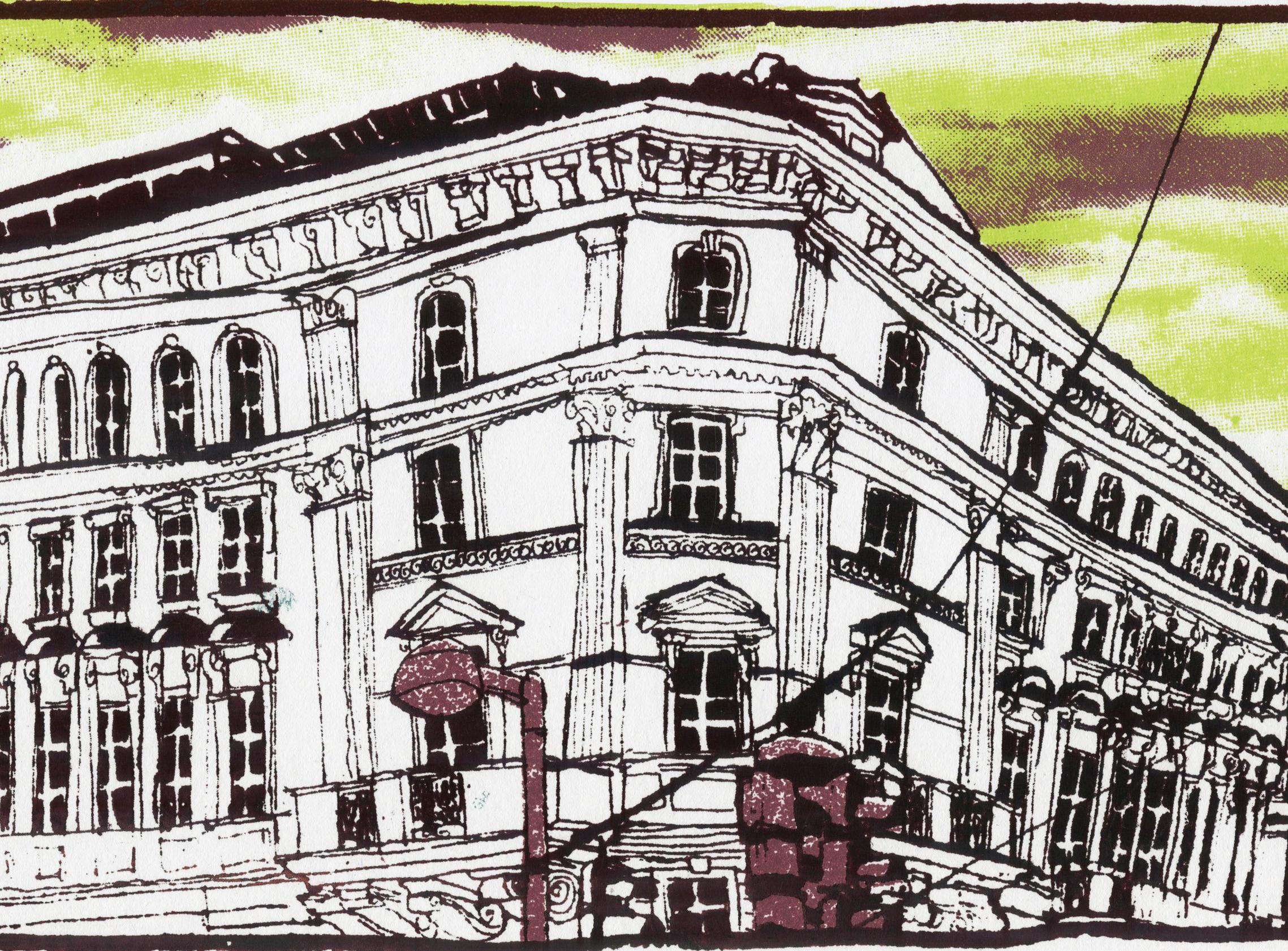
a chapbook companion to poictesme2013
The rocky earth was split wide open and scattered away from the crack.
Trackers say, “Here’s to hopin’, rather than end, it leads us back.”
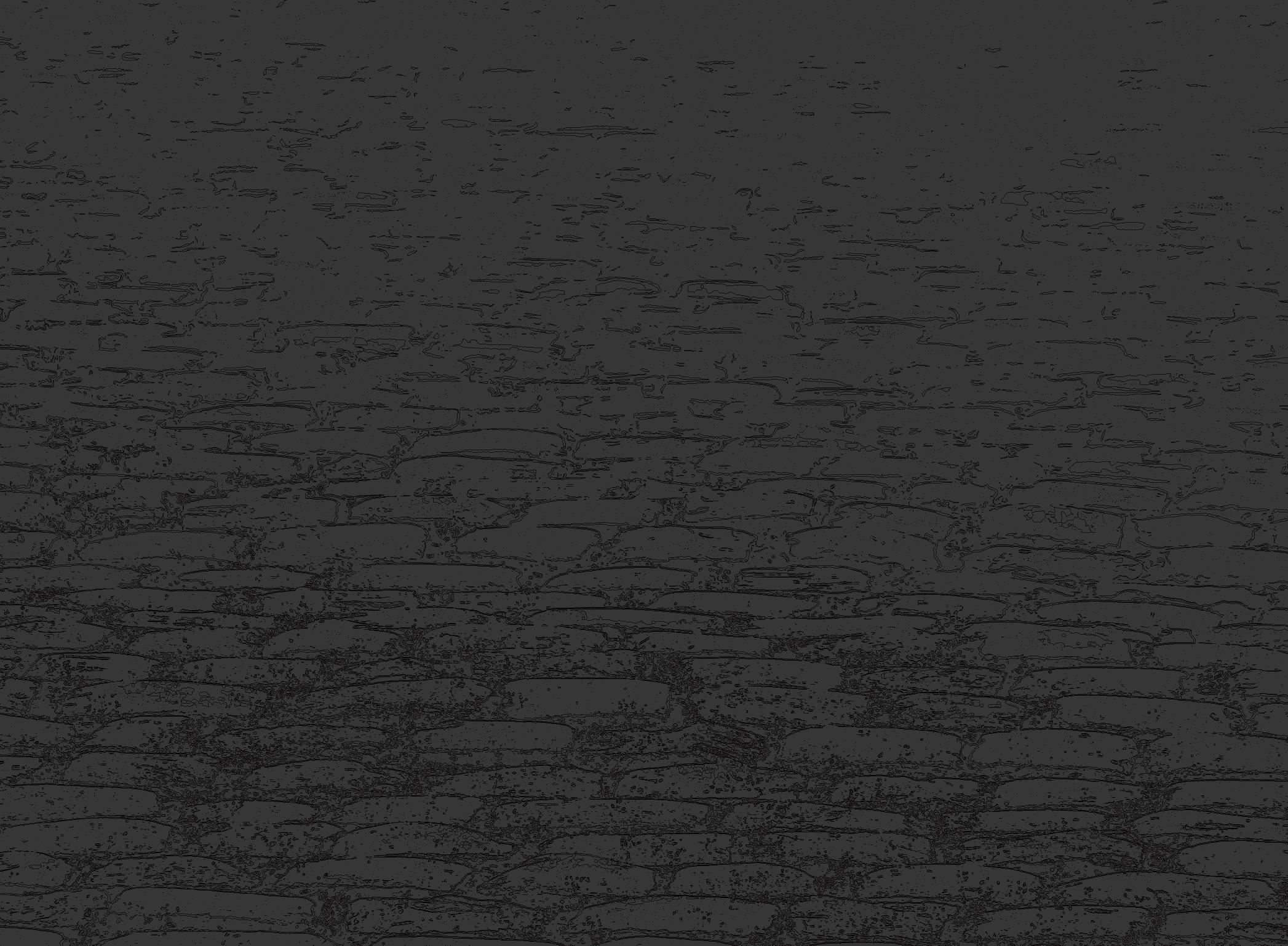
Poictesme (pwa-tem) is a student-run literary and art journal of Virginia Commonwealth University. Cobblestone(s) is the first ever chapbook companion to Poictesme.
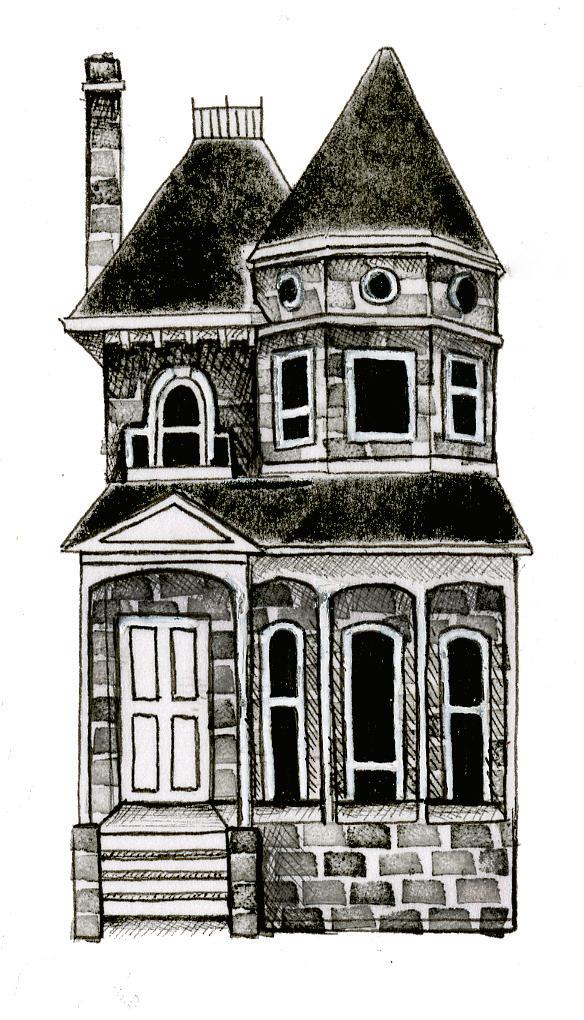
Student Media Director • Greg Weatherford Production Manager • Mark Jeffries Business Manager • Lauren Katchuk
Carla
Kristen Rebelo Eleanor Doughty EDITORS designer COVER ARTIST Nicholas Shipman Leslie
Britney Barbour Margaret Goslin Amanda
Richard DiCicco WRITERS illustrators Kristen
Kyle
Ameorry
Emma
Elly
Skye
Templeton Kelley
Hannah Morgan Alex Carrigan
Dominquez Lyndon German Templeton Kelley
Pyo
Hitchcock
Rebelo
Saxton
Luo
Scarvey
Call
Young
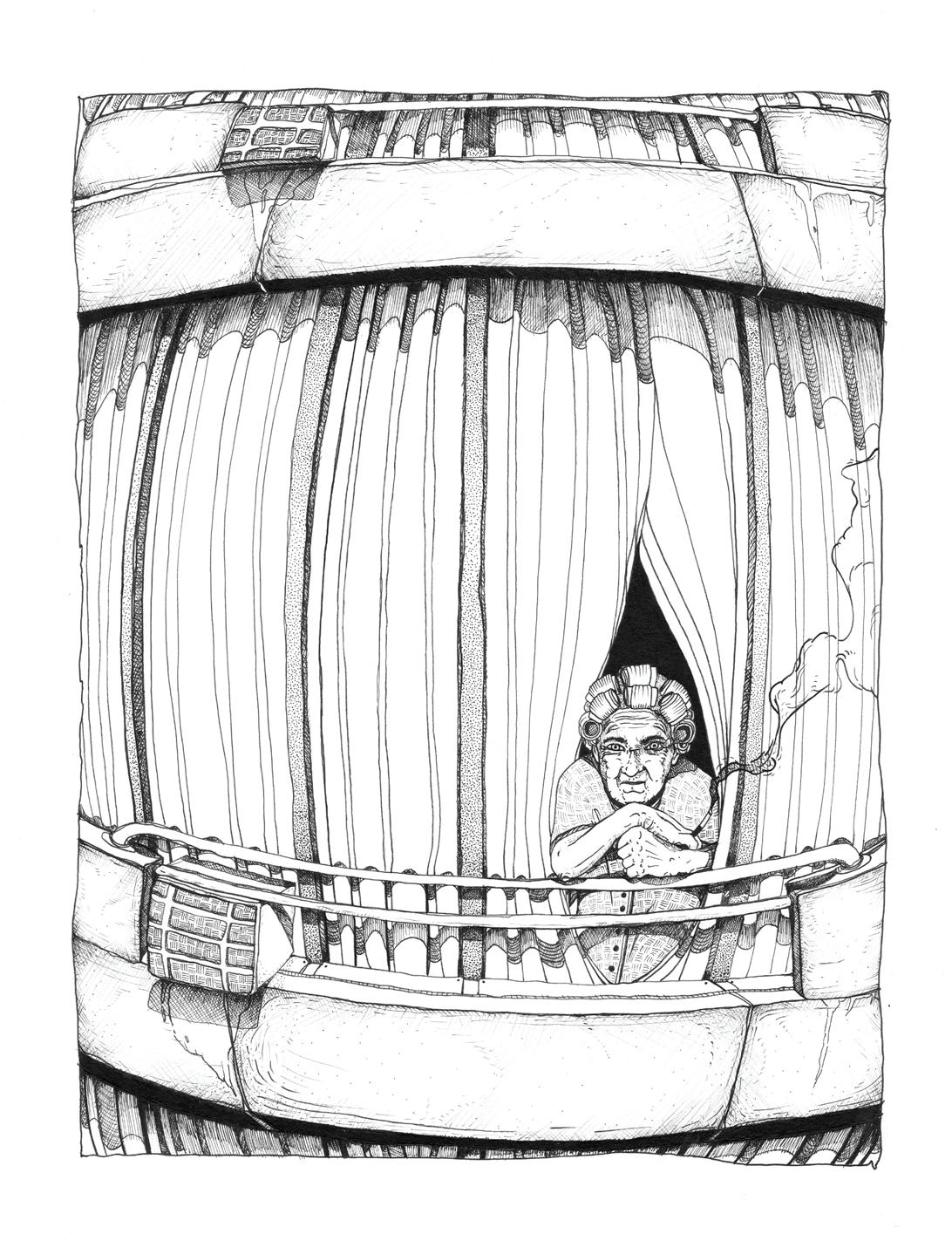
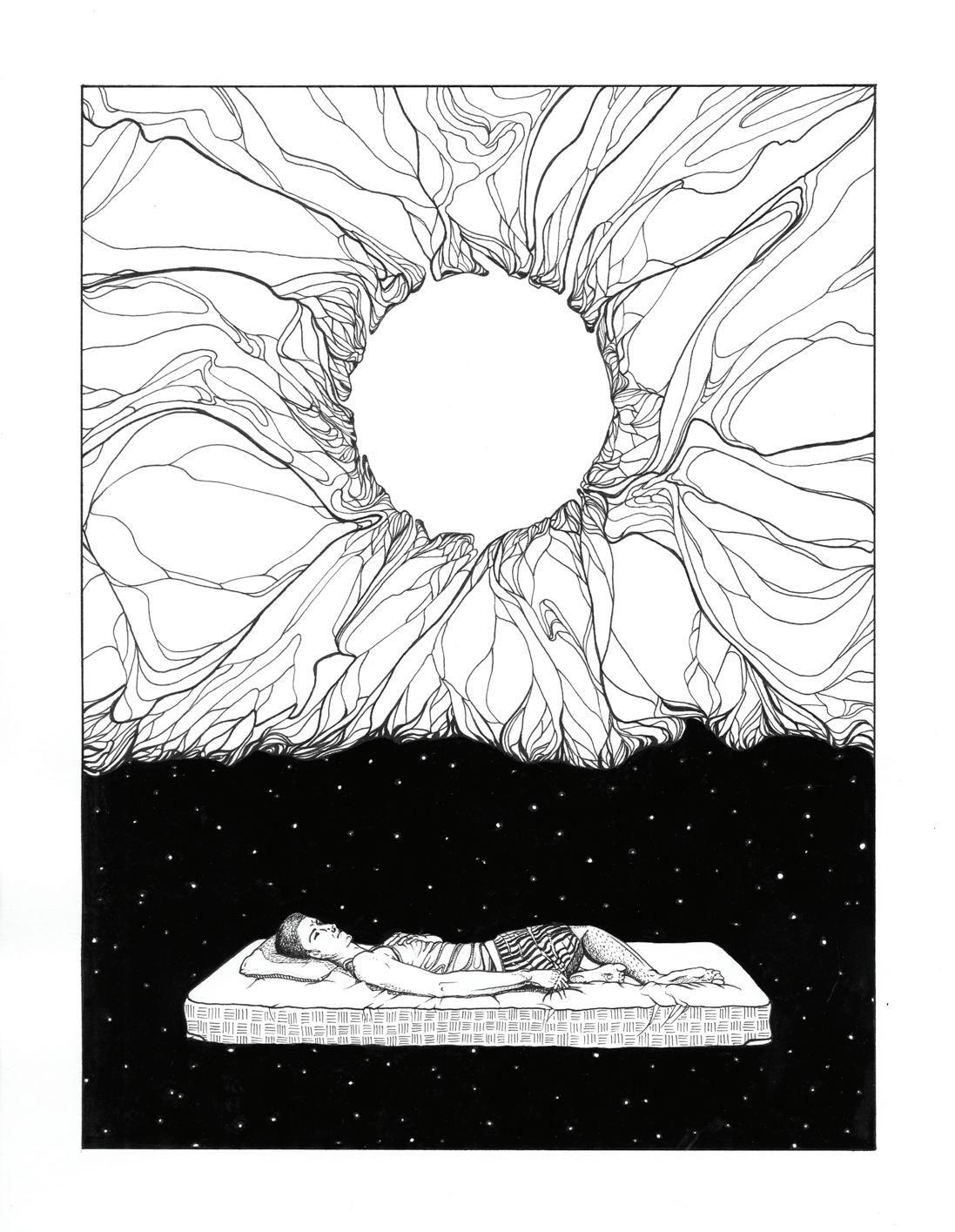 Stress Kyle Saxton
Emergence Kyle Saxton
BY NICHOLAS MORGAN SHIPMAN
Stress Kyle Saxton
Emergence Kyle Saxton
BY NICHOLAS MORGAN SHIPMAN
Did you ever love a girl with hair like mead, darkling gold as hawk wings in the sun?
She was gone in the morning.
If a crowd applauds for an empty stage, was the show good?
 BY LESLIE PYO
BY LESLIE PYO
ummertime. Have you lived through one of those summers when the heat seems human? The warmth infusing those days was clear molasses. It was as though it came from the earth itself, from some friendly presence beneath the cool black dirt and roots that wanted you to feel it there. Right beneath you. It came up through the earth’s crust to your arm hair and through your bare feet and scalp and into your thoughts, dripping through your head.
Patrick stared into his mirror. His forearm was tinged blue-green; he had just taken off a tight band of gauze.
Thday the gauze began had been cold. The morning outside his window had slowly fluttered grey and lazy, apathetic breezes rattling various neighbors’ wind chimes. Patrick was preparing for school. He had put on his shirt,
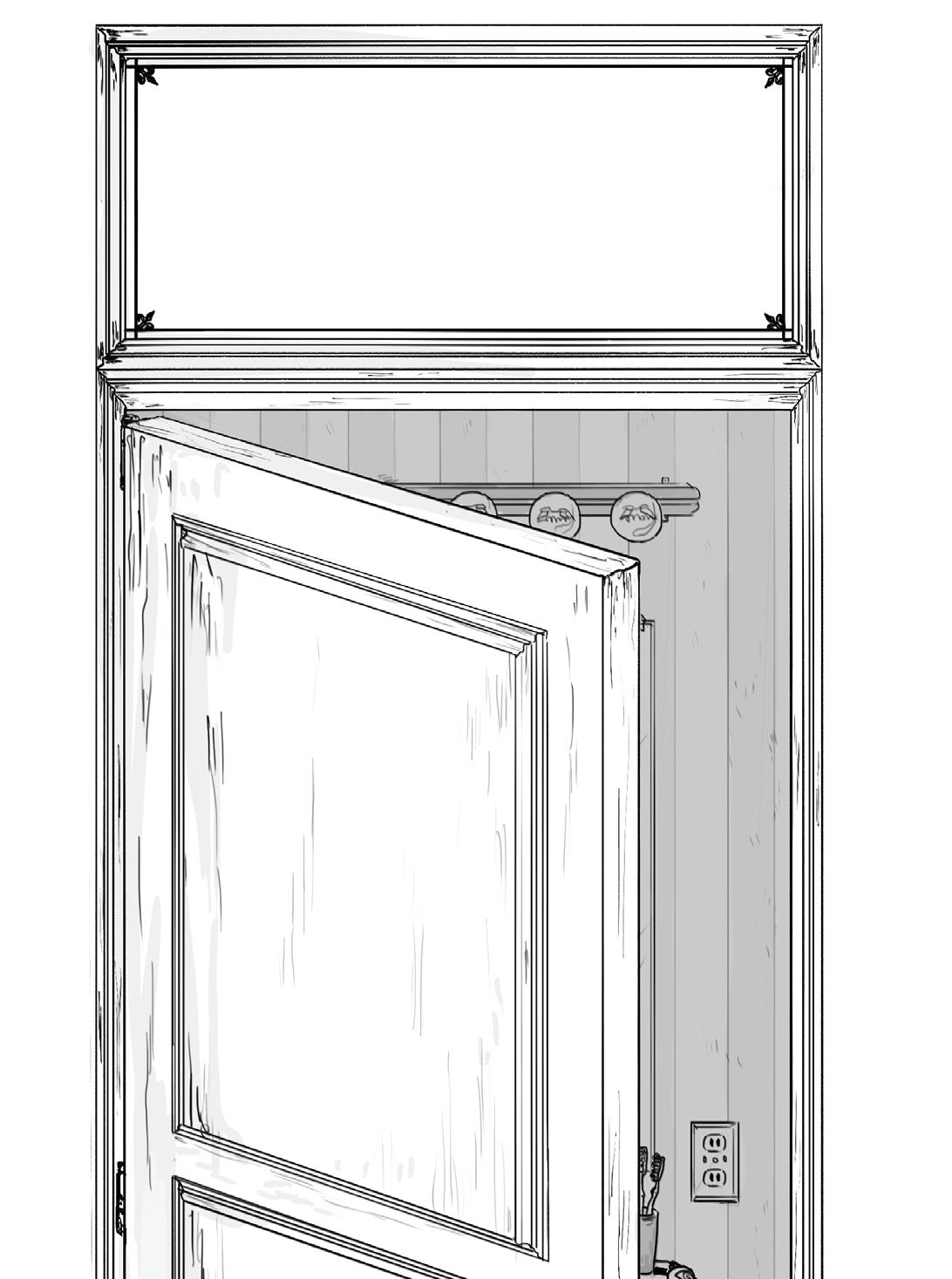 Illustration for this story by Ameorry Luo
Illustration for this story by Ameorry Luo
his pants, his bracelets, his shoes whose dilapi dation he was fond of. And he was profoundly unsatisfied with himself. Cottony sadness seeped inside him. It caught in places. Up against his bones. He grabbed a roll of gauze from the medical kit he kept by his desk, and wound a length of it around his forearm. He felt slightly better. Throughout the day, snow flake questions peppered his warm skin. “What happened this time, Patrick?” “Are you feeling well?” “What’s the meaning of this bandage?” “Why are you wearing that?” He felt annoyed.
Just a few weeks into that December, he had decided he wanted it off. He had stared into his mirror as he unwrapped it, and was surprised to see the unharmed skin that poked through as the material fell away. He walked across the hardwood floor to his kitchen, where he opened the knife drawer.
That had been December: a year and a half ago. Now, here was this clear molasses summer that made his gauze itch and sweat and yellow to the ambient rhythm of grass being clipped and people laughing into the air and awkward eye contact as he paid for ice cream bars at the public pool. He was tired of wearing it.
He loved knives. He owned this one special paring knife. The handle was cold smooth steel, the blade an extension of the same material but lovingly sharpened to eat through anything: warm tomatoes from his mom’s garden, the melancholy avocados he quietly sliced for quesadil las, strawberry halves for angel food cake. The strawberries always pressed pale red patches into the white cake. But his favorite thing to slice was a mango. He loved halving the fruit, cutting the soft leathery skin off in thin sheets, his knife separating the pleasantly resistant flesh from the seed with a calm knowledge of its own
power. He remembered the time his brother had borrowed this knife. Patrick had been in eighth grade, his brother in eleventh. He had walked in on his brother’s friends goofing off in the living room, splintered wood chips littering the thin carpet, branches half-carved resting on their femurs, the knife dull and edged with tree sap. His brother had looked up at him and grinned happily.
He continued to look at the knife for a moment. Then he picked it up, went into the bathroom, and closed the door behind him. It was a Saturday: the house was pleasingly still and quiet. His mom was upstairs, reading in her bed; his dad was dead; his brother and sister were still asleep. He looked at the knife again, and began cutting his arm. If he were to stop wearing the gauze, he would need to have a reason for wearing it in the first place. People might think he was a faker. They didn’t understand, and Patrick was suddenly very angry that he should need to validate his gauze for their sake. He really wished he had placed the gauze somewhere else, like his leg. He did not want people to think that he “cut.” Maybe he could
whittle a little hole, and tell people he had run into a… a what? He ended up with a kind of oval, shallow bathtub in his arm that quickly filled red. Patrick rinsed the knife and set it down on the counter next to his toothbrush. Then he remembered he had not brushed his teeth. He brushed them.
He remembered the first time he had seen his sister wear a dress. He had been in eighth grade, she in fifth. His older brother had picked up his sister and swung her around in the green grass of their front yard and called her very pretty. She had giggled and shuffled in the dirt between the blades of green, the straps of her new plastic sandals rubbing her ankles a little raw. Patrick had been angry with the whole scene.
He rinsed and spit.
The next day, Patrick’s mother asked him what in the world his paring knife was doing in the bathroom, and he told her that he thought a knife was more manly to use when he shaved than a razor. “Boys will be boys.”
The shallow cut Patrick made healed by March, leaving only a faint pink oval that quickly faded. For the short time that Patrick actually needed to stop the blood, he used a big Band-Aid underneath the gauze. He did not like the feeling of the gauze against his raw cut skin. He never again considered cutting his arm to validate the gauze. He just kept wearing it. And soon enough, people stopped asking or caring why he wore it.
This summer creaked under the weight of its own gelatinous expectation. As he unwrapped his arm, he enjoyed the feeling of cool air washing over his forearm. Swaths of gauze slowly wound away. He stared into his mirror. He walked through his living room. He pushed open his screen door, and stepped outside.
He let the hot clear molasses fill his eyes; he let it drip through his head and let its warm fingers touch his arms. He thought about his brother, his sister, and a little about the way his mom’s eyes undulated when she looked at him. As he thought, he felt okay.
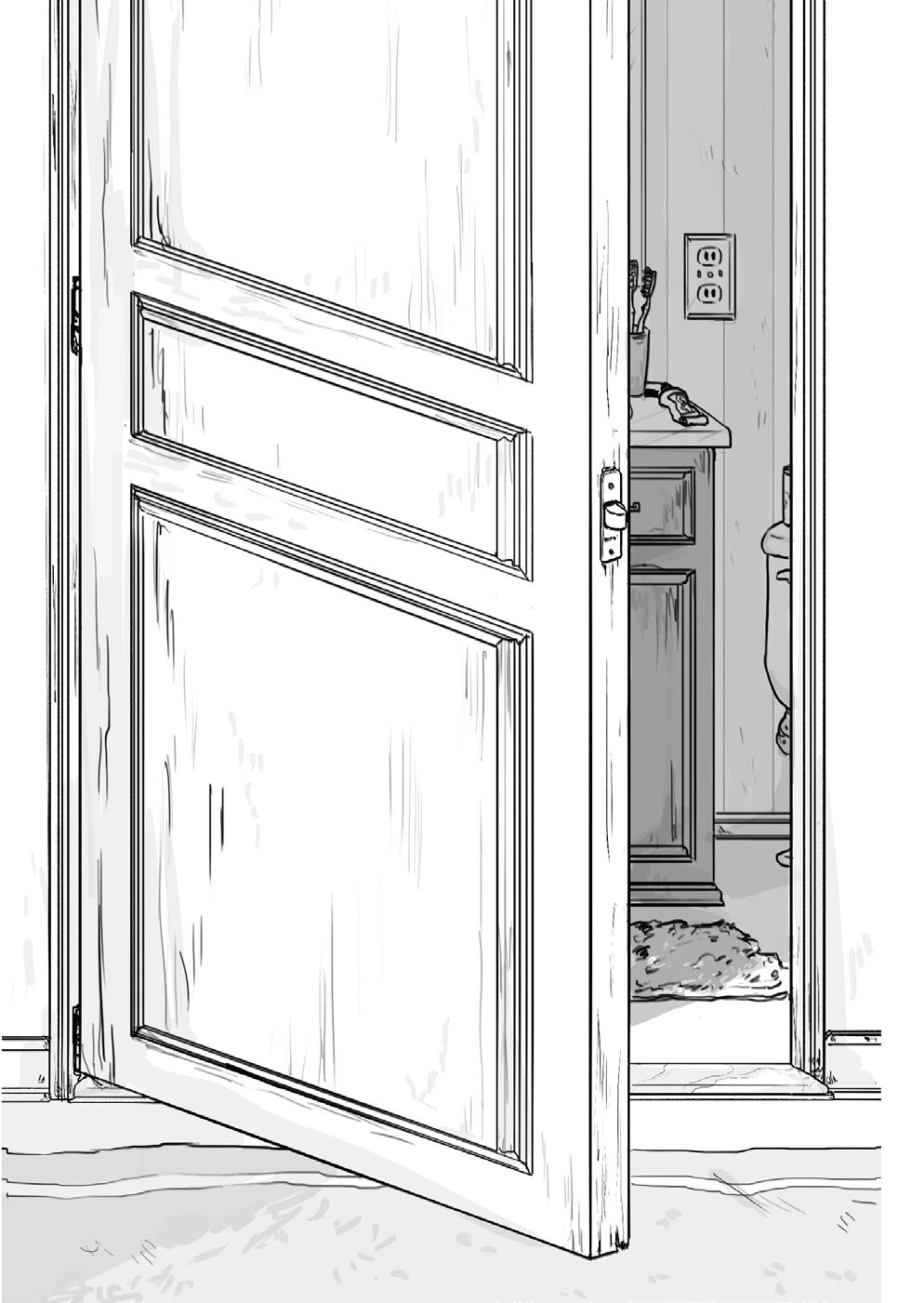
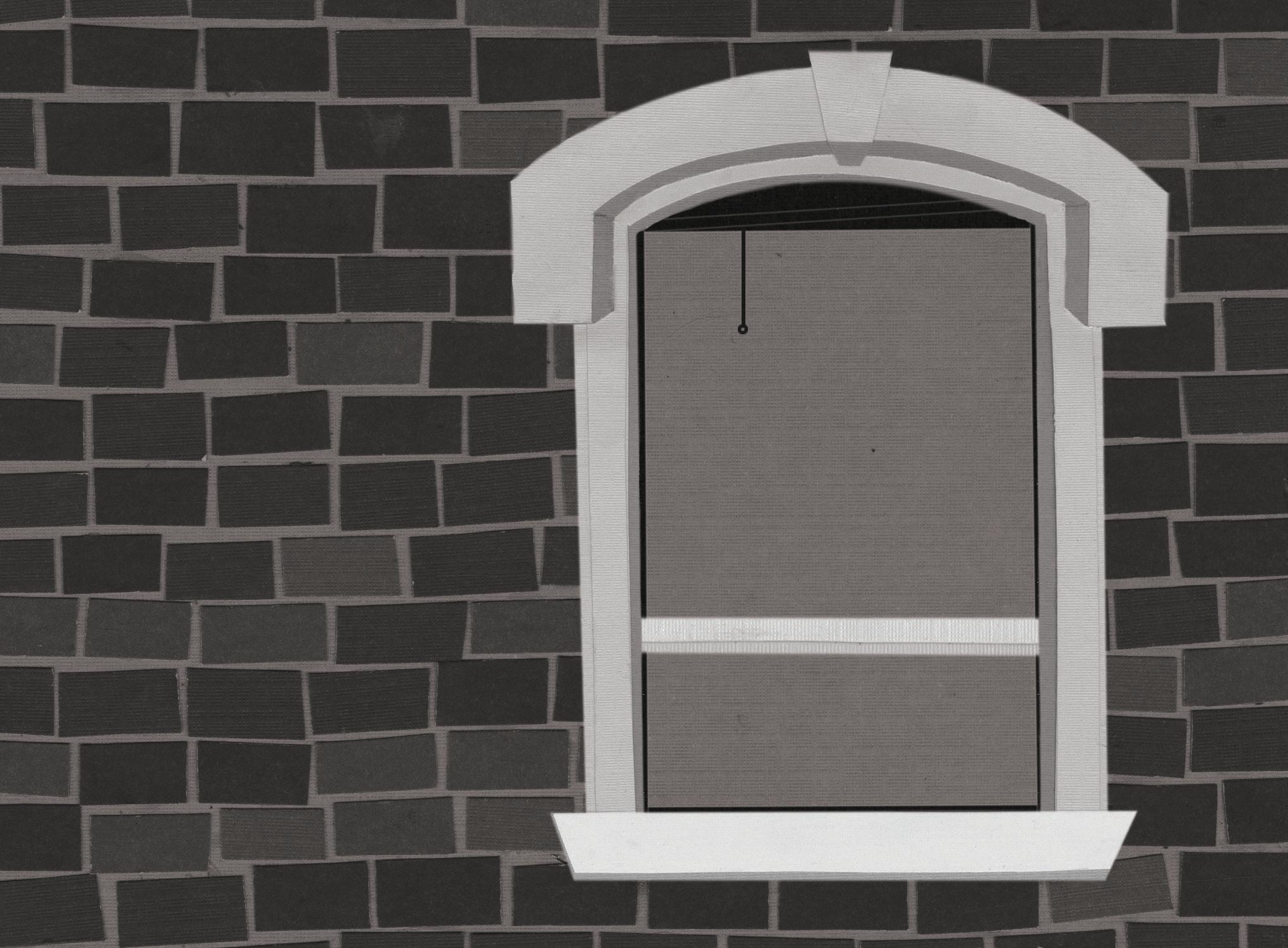
AJANI
, FROM HER
JACKSON WARD WINDOW
By Brittany Barbour
t’s 10 a.m. and I’m up early on a Saturday because Dante is thirsty. Woke up to a text from him like… “Wussup boo. We ain’t talk in a while, shit.” He ain’t slick. Men like him don’t wait till it’s dark to make booty calls. But it’s Saturday, and all I got on my mind is going to Posh. Waka Flocka is supposed to be
by Emma Scarvey
there. Jasmine just got those 16-inch Brazilian tracks I been pressing her for, and Shanice is gonna be driving her new car. I already got my outfit planned: - pink, blue, and green shoes - pink half shirt - green and blue streak in my hair - silver hoop earrings Now all I need is some blue leggings. I’ll probably hit up that store in Carytown, where the white folks be at.
It’s cool in there sometimes. They got a few black folks working in there now, but they put on fake smiles and stare down they wide noses at us when we come in. They got them trained up in there, like some fucking robots. Niggas can’t be niggas in a place like that. I know their boss told them to keep an extra eye on us when
Illustration
we come in. And I know how much we stand out when we come in.
They had this one black chick who worked in there. She was cool as shit and thick, my God. She made them clothes look good and she used to keep it real with us.
“Y’all know they make most of these clothes for skinny white girls, right? And they kinda overpriced but please buy something. I need this commission.”
She was a trip. They fired her, though. Dante texting me again.
“You trynna hit up Jamaica House right quick?”
He ain’t slick. I already know it’s gonna be no seats left in Jamaica House and he gonna wanna eat at my place.
I would go, cuz he usually pays, y’know. But I hate going around near the college. Those trifling ass kids always hate on us, like we wasn’t here before they was. My sister overheard some white freshman bitches in class talking about, “Watch out for the locals.”
Those kids fucking kill me. They come in our neighborhoods, buy our weed and shit,
don’t try to pay us, and send out alerts to everybody on campus when niggas come back to get they money.
Then gonna say, “Watch out for the locals,” like we some wild animals or some shit. Hell, we should be watching out for y’all. Y’all the ones not paying up.
Dante texting me again.
“Damn, can’t answer a nigga? I know you over there ain’t doing shit.”
He ain’t slick. I know he across the street and see my car parked outside. My sister probably ran her big ass mouth and told him I ain’t bring nobody over last night.
I wish VT would text me. But he don’t fuck with me no more.
He got some new girl. Some light-skinned chick that wear her hair nappy. She ain’t from ‘round here. I could put 5 on it right now that she a DC bitch. They think they all that cuz they dress like the white kids and listen to rock music. Wearing leather boots with booty shorts in the summer time and shit. Over it.
But VT likes them type of girl. Girls that’s real different, ya feel me? He get so much pussy,
I bet he gets bored.
I used to be different. To him, at least. Until I told him we had to stop fucking. Now, he don’t fuck with me. But I bet if I call him up right now, he’d drop that bitch in a heartbeat. She ain’t puttin’ it on him like I was.
I’d put 5 on that.
Dante calling me now.
He ain’t slick. I already know he gonna keep calling me until I answer the phone with an attitude. Then we gonna start arguing. Then I’mma say, “Come say that shit to my face.” Then he’s gonna show up at my door like....
“Wussup boo.”
We do this all the time. Shit.
I should show up at his door for a change. But all those college kids live in his building now. With they skateboards, and they bikes, and they weak ass American Spirits, and they tattoos.
Those kids kill me.
When they see us coming from the club with our outfits on, the first thing they say is ratchet. But then they turn around and throw some dirty old clothes over their crazy tattoos and call it
artistic. They even got them modeling for all the fancy boutiques around town and shit.
The police don’t harass them.
And most of them can still find jobs. It makes me sick.
My sister say she gonna move when she graduate. She saved up all her money from when Ma died and even had me take her off my taxes so she could file as a independent student, or something like that.
She wanna go out West. I might go with her.
I don’t like feeling like a stranger in my own damn neighborhood. Police all over the news saying how downtown is so much safer these days. But where was they at during all the block parties and cookouts and community days and family reunions where everybody on the block was invited?
They was pushing us against a wall. Now they mad that we fighting back.
I want to leave but it’s too much stuff going on right now. I don’t know where I’mma be at in 5 years. 2 years. I don’t even have leggings to go with my outfit tonight.
And Dante still calling me.
2:37 P.M.
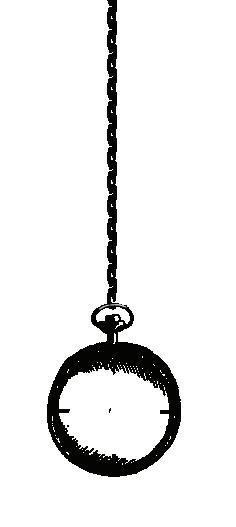
My mom finally arrives and walks into the shop. She sees Diane and looks away quickly. She motions to me, but I don’t get up. She walks to my table. I pack up my books. I notice my mom’s eyes keep shifting over to Diane, who has hunched her shoulders slightly. Before I go, Diane looks up at me. I raise my hand to wave or something, but I look away instead, feeling the heat rise in my face. We go to the car.
On the ride home, my mom asks me about school and about my friends. I say the word “fine” seven times. She doesn’t mention Diane. I tell her what my name means and she smiles. I tell her what Diane said about her name making her feel like a movie star. The smile is gone. She shakes her head. She says that Diane is nothing like the lady from the movies. My mom tells me not to associate with girls like that. I don’t say anything because I’m not sure what she means by girls like that.
She hasn’t noticed the hole in my jeans.
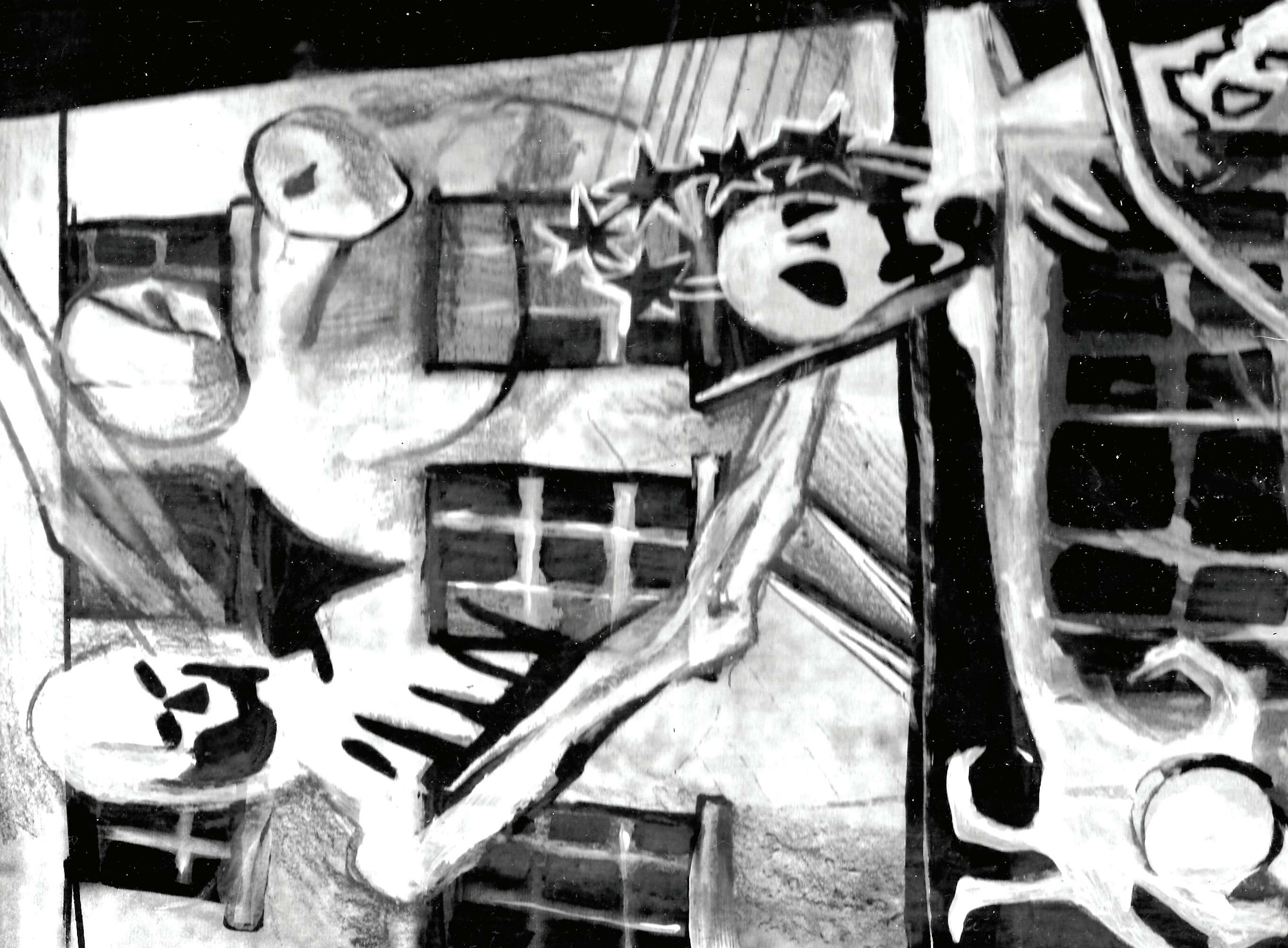 BY RICHARD DICICCO
BY RICHARD DICICCO


in between. In the unrelenting heat, I’d watch cars floating down the road slowly sink into the earth. The naked boulevards of suburbia kept no shade, and I found myself walking down your long, lonely street when the comforts of home turned sour.
ou never told your father what we did. In his eyes, we were just kids. It was safer to let him believe that we were just kids, even as we stopped coming home for dinner and started sleeping in each other’s beds. But the truth is that it was easier to pretend that he didn’t care.
Last summer’s haze turned the world into a painting, soft at the edges and shimmering
Your neighborhood was the last branch on a withering tree, a remnant of a town once marked by farmland. Past the shopping malls and corner stores with bulletproof glass was a moss-coated sign that whimpered “Aspenwald” through paint and ivy. Your home was garish and tall, swathed in gaudy colors that your mother once adored and your father never painted over. The pink shutters peeled even then, and the bananayellow siding faded with every passing season. I spent most of the summer in your broken home—between your legs, as it were. When your father’s car pulled out of the driveway, you lit up my phone, and I made my trek
Illustrations and title typography for this story by Templeton Kelley
through heat and concrete to feed your voracious appetite. The first time we had sex was in your father’s bed, and from then on it was always in his bed, with me on my back and you chafing your thighs in an attempt to grind me down to my very bones. Our clothes never fully came off, and to this day I’ve only ever seen your body in halves.
Our brief, ugly moments of intimacy left me sore and wanting, but I never told you how much it hurt me. I could feel a monster inside of you, something vicious and unsatisfied, and I was afraid that you would swallow me whole if I ever pushed you off of me.
But I suppose dissatisfaction was what held us together. We were both artists, world-beaters in a town full of complacent parents and blearyeyed youth. Where our generation had dulled their taste for ambition with pills and alcohol, we found ours in the limitless realm of art. It’s no wonder that we discovered each other at a warehouse party packed with wayward souls. We looked so different—you, leaning up against a bare wall; me, slumped in a fold-out chair. Your bomber jacket and knee-high boots
stared down my dour plaid and Chucks with a weighty, lustful gaze. But we had some innate connection, you and I. It wasn't one of love or luck, as I've come to find out, but an occult destiny. Yours was the name I would have read on a Ouija board.
You only need to shock people’s sensibili ties once for them to remember you, and the underground scene knew us very well. Elsa and Michael, we were like Marina and Ulay. I used my words; you used your hands. Our first foray defied experimentation: to the Johannes Gallery, we boldly submitted a multimedia performance piece based on my series of poems protesting the Vietnam War. The gallery held one performance. Carefully-placed speakers assaulted the audience with graphic radio news clips and searing electric guitar feedback while you writhed blindfolded on the hardwood with a loaded gun in hand. Amid backwards abstractexpressionist trash and small-minded minimal ist cubes was our bombastic anti-war sensory overload, and by the end of the week we had been contacted by every culture writer in town.
I was satisfied with the contorted look of dis-
gust on our patron’s faces—proud, even, at our work. But you always had grander ideas than I, and my own prolificacy steadily began to wane as your work required more hands than your body provided. With every barbed-wire sculpture and auto-destructive machine that was welcomed into Johannes, your ego swelled and your projects grew more elaborate. You were granted entire showrooms to let your art stretch and climb. Meanwhile, my manuscripts yellowed and slinked away to desks and dustbins, yet your name remained on the dedication pages.
Your time in the sun, as we both know, was quite fleeting. You always said that our earn ings were merely funds for our next project, but money was disappearing faster than we were working. By the time we got to work on your last project, you were still living in your father’s house. Small-town fame came and went too fast for you to savor, and you feared being forgotten. So many of your actions have been fueled by fear, Elsa. I can’t help but wonder whether your last project was born solely from it.
The day you told me about that last project began like any other. I watched your torso
writhe and bounce on top of me, wrapped in an orange sweatshirt that kept sliding down your shoulders. To say that I felt numb would be to ignore the circumstances, but something seemed strangely off about you. You were distracted, your eyes unfocused and glazed over.
When your face flushed and your pace slowed, you rolled off to your mother’s side of the bed, the one that never ruffled or creased. You were still breathing hard, staring off into a world I couldn’t see.
I asked, “What’s wrong?”
“Nothing,” you said hoarsely. “I’ve just been thinking.”
“Thinking. Okay.” My chest was sore from your palms pressing down on me.
You bit your thumbnail. “I found something today. Some materials for my next project. They’re out back.”
“You’re working on something?”
A familiar crinkle of tires on gravel stopped my heart. Your father was home early.
“Oh my god, he’s home!” you cried. “I thought he was going out with his poker fags tonight! Fuck!”
You shot up and scrambled across the room to search for your clothes. I buttoned my jeans and got out of bed, careful to rustle the vanilla sheets back to the mess they had been before our routine fling.
“Why did you have to come over so late?” you wheezed, hurriedly pulling your panties up your porcelain legs.
I had been writing all afternoon, and I was sick of dropping everything to come over, but I didn’t say that. I just watched your twiggy frame bending over to grab your jeans, your tousled mane of plastic colors swinging like a mop head.
“If my dad knows you’re here, he’ll freak,” you said, pointing at me like it was my fault you had been keeping secrets. “Get downstairs quick and go hide in the backyard.”
“What? Why?”
You yanked denim up your legs. “Because,” you paused to button your fly, “I need you to come around front and ring the doorbell as if you’re picking me up.”
You stepped close to me, much closer than we had ever been outside of bed. I could see
deep circles under your eyes, dark and sagging; the months were turning into years on your skin. “I need your help with my next project. Tonight. It can’t wait.”
The kitchen door swung open downstairs. A hardy voice rumbled, “Elsa? I’m home!”
“The materials are out back,” you whispered. “I’ll take you there. Just ring the doorbell in about ten minutes or so.”
Your lips brushed mine and you shoved me out the door. I could still hear your father moving around in the kitchen downstairs. Looking back, I motioned to you to go distract him, and you skipped down the stairs quickly. I sat down on the top step and waited.
“Dad!” You disappeared into the kitchen. “Afternoon, Elsa. Why is the percolator not ready?”
Metal clanked around. “I’m sorry, Dad, I’ve been busy all day—”
“And I haven’t? Get the coffee ready.”
I heard your father slump into a chair, and I stood up quietly. Careful to skip the louder steps, I crept down your rickety staircase and took a sharp hairpin turn at the bottom banister
to slip out the back door.
Behind your house was a lone dirt road that led into undeveloped land. It was hardly a virgin plane, as it had been stripped bare many years prior but never used. Pits and dirt mounds pockmarked the landscape like a suburban no-man’s land. The tightly-packed row of houses that made up your neighborhood seemed to be placed simply to block the sight of such an ugly patch of earth, raped and forgotten.
The ripe afternoon sun doused that backfield of weeds and browning grass in a delicate persimmon. I couldn’t tell if the world was trying to set it alight or preserve it from decay. That single road reached out to me in desperation. It was a straight line hard and unwavering, laid bare in front of me as if it were aching for some signifier of civilization to come rolling down its dusty trail.
Two sets of overlapping footprints led to a black mass way down the road, flat as a stingray but at least ten feet long. It sat awkwardly on the left shoulder of the road, too far away for me to discern what it was. Its skin billowed gently in the wind, alone in a sea of death and disregard.
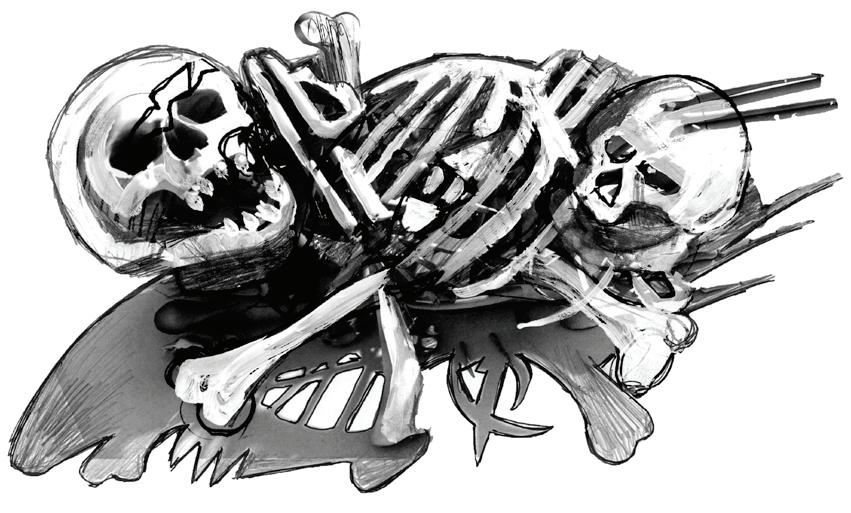
The mere sight flipped some primal defense switch in my brain. I could smell something faintly foul on the stale air as the sizzle of busy insects rang in my ears. My feet moved instinctively, and I began backing away like a frightened dog until I was up against your house’s vinyl siding. Surely, whatever was lying in wait could not constitute “materials” for a new project.
I sprinted down the side of your house, over wilting flowers and hardened mulch beds, and swung around to your front entrance. Your stoop was simple and unadorned, just concrete steps leading to a battered white door. I
rang your silver doorbell and a muffled chime hummed behind your walls.
Heavy feet thumped to the door before it swung open. There was your father, staring me down. I had never taken a good look at him until then. He looked like he was built from spare parts, oddly rigid and misshapen like a junk yard car and his head square and tapered like a plank. He was still in slacks and a starch white shirt, rustled just enough to suggest he had been doing something more than paperwork all day. You once told me he was an old corporal—a Korean War vet—and he still had a look of mistrust towards foreign skin such as mine. I shrunk in his presence.
“Milton,” he said in a cold, flat tone. His accent sounded like it was from everywhere and nowhere.
I kept moving my hands in and out of my pockets, unsure of which was the proper way to appear to him. “M-Michael, sir. How are you? Is Elsa home?”
“I’m doing just fine, son. And yes, she is.” That’s when you came screaming out from the hall behind him.
“Ah, Michael! I’ve been waiting for hours for you to get here!” You squeezed in beside him, just a fraction of his height. You two couldn’t look more different.
He looked down at you. “Are you going somewhere?”
“Michael’s my, ah, business partner. I’ve told you before, Dad.”
“Mm.” Your father turned to me. “What is it you sell, again?”
My tongue groped for ideas. “P-percolators.”
His face actually managed a smirk, though it may have just been a twitch.
“We sell paintings, dad. Michael’s just joking. Aren’t you, Michael?”
“Yeah,” I said.
Your father shrugged, and it seemed like every shape he was constructed from shifted position. “Well, get goin’, then. Remember your curfew.”
You headed down the steps as the door slammed behind you.
“Let’s go.”
We skulked back through the wilting flowerbeds towards that endless road behind your house. The heat was starting to dissipate but the
sunlight was dense and more invasive than ever. The sun leaned down close to watch us.
“Why don’t you tell your father about our work?”
“He wouldn’t understand,” you said, crushing a dandelion beneath your boot. “He’s an army vet—people tell him to kill and he pulls the trigger. Even now, some bank tells him to move money or close an account, he does it. He doesn’t question things like we do.”
“That’s harsh.”
“It’s the truth.”
We stopped at the foot of the dirt road. You pointed to that black lump in the distance. “That, there. Come take a look.”
I couldn’t move. My feet wouldn’t let me. You pulled on my arm. “Come on!”
I stumbled, tripping over my better judgment, and you dragged me down the road like I was a stubborn child. The black mass grew larger with each step. As we came closer, that foul, pestilent odor overwhelmed my senses. My body knew what my mind rejected, and when we arrived at that black blight on the earth, my stomach was poised to lurch.
I stood still while you circled it, probing the space with your eyes.
You sounded proud. “I threw my dad’s truck bed tarp over it.”
My eyes nearly watered at the putrid stench. “What is it? Is it alive?”
“Oh, goodness no.”
Squatting, you spread your arms and reached for the edges of the black tarp like a magician ready to reveal one last trick. Then, you threw the vinyl back with a morbid flourish, and I stumbled into the weeds.
There, lying in the dirt behind your house was the body of some poor young soul, mouth agape in an eternal expression of immense regret. He was clothed in simple attire—cheap jeans and a button-down one size too big. His eyes were rolled back like he was straining to get a look at you, and his sickly white limbs were sprawled out like tree roots. The back of his head was blown apart, caked in dried blood. A fine spritz of gore was speckled on the surrounding foliage.
I stood up slowly, but my legs were shaking. "Who is this? Why are you hiding it in
your backyard?"
You kneeled down next to his bloated torso, picking dirt off his breast. “I didn’t wanna let the flies get to it.”
“No, no—why didn’t you call the police?”
You turned to me sharply. “And what? Give this all away? I took one look at this and I was inspired, Michael!” Your eyes fell on his drooping lids with a forlorn gaze. “I felt like Picasso looking out on Guernica. It’s such a terrible beauty, this one. Such a tragic fate. Only art can redeem it.”
The words were in the back of my throat. You’re mad. You’re crazy. But I choked. Who else was there in this cold, unfeeling world but you? You were the only person who would read my stories without a signed check clipped to the front page. I was only relevant through you.
So I kneeled down next to you and laid my eyes upon that corpse, trying my damndest to see it as a sack of flesh and nothing more. But his fingernails had dirt beneath them, just like mine, and I know I had that shirt somewhere.
“Look at him!” you squeaked. “He looks like a marble statue, Michael. Our own little David.”
Our own little David. You told me that you needed to go get the truck, and that I should stay there with the “materials” until you got back. So I sat in the dirt swatting flies, asking David questions as the sun sunk below the horizon, nauseous and weak. I asked him where he was from, if he knew you, if you’d do the same thing to me. Part of me expected an answer.
I saw a red glint of metal turn down the road as you drove the old Chevy back to me. The tires erased our footprints with a careful precision. You pulled up next to me and David, your arm hanging over the driver’s window like you were picking up gas instead of a dead body. The door opened and you leapt down. “Wrap it up in the tarp and we’ll lift it into the back.”
We both got down in the dirt and spread out the black tarp beside David as flat as we could. Then, we slipped our fingers under his stiff back and did our best to roll him over. When he was on his side, you patted the dirt off his back as if you were sweeping dust from an old bookshelf. He fell facedown onto the tarp, and we continued to roll him up until he was in a neat black tube like a carpet in a warehouse.
We lifted it and carefully moved it to the truck bed. I had the legs; you had the head. The sheer weight was an anchor to reality. What were we doing? There was a body in your truck and I was walking around to the passenger’s door, totally unaware of what you were going to do next.
The sky was a cold azure. I couldn’t get David’s slacked jaw out of my head.
On the drive back, I asked, “How did you find it? Him, how did you find him?”
Your fingers hung loosely from the bottom of the steering wheel. “I was watering the plants out back when I saw something lying in the dirt. So I walked out and there it was.”
“That’s it?”
You nodded. “That’s it.”
I watched your house get closer. “Did he kill himself?”
Your fingers tensed on the wheel. Ten-and-two. “I don’t know.”
You parked the truck behind your house and we took the body down to your rough gray cellar door. The long hiss of bugs flattened the noise of the fields into a blaring siren as the daylight faded.
“Get the door,” you instructed, pointing to the cellar. “I’ll get the materials.”
The short set of stairs leading down to the cellar ran at least five or six feet deep. I twisted the cold doorknob and opened it into pitch black darkness, pressing my body up against it to hold the entrance open for you and David.
With your sweaty back facing me, you grabbed the bottom of the tarp and pulled it down the steps. The head bounced off every stair in heavy, dull thuds. When you reached the bottom, you dragged the body across the concrete floor and exhaled sharply.
“Close it.”
I stepped away from the weighty door and it fell shut on its own. The darkness was oppressive, an inky black tomb closing in on me.
A feeble incandescence appeared above a work table along the wall. Your hair was sepia-toned in the low light and you looked to me with an unbridled enthusiasm that I had never seen before. Your eyes could have lit the entire room.
You disappeared into a corner and began pulling down paint cans and planks of wood from a metal shelf. I drifted to the center of the
room to let David out into his final resting place. He was laid down unceremoniously like an unrolled camping tent. On my knees, I pushed him over until the tarp unfurled again and that horrible stench filled the cellar’s confines.
“What are we gonna do with it?” I said, teeth chattering.
You strode over to David with a can of gold paint and a roller. “Bring it back to life.”
Your process of resurrection was quite different than what I had been taught in Sunday school. I don’t know how long it took, but in the neardark of your freezing cellar I watched your blurry form assemble a crude crucifix from several planks of wood. Then, we stripped David down and laid him on the cross like a bloated,
pasty Jesus. A savior of nothing. You used a hammer to drive nails into his hands and feet, and I had to cover my ears to muffle the squelch of pierced flesh and rusty metal.
With a screwdriver, you popped open the can of gold paint and poured it into a pan, then used the roller to coat
David’s colorless body with a tawdry mustard sheen.
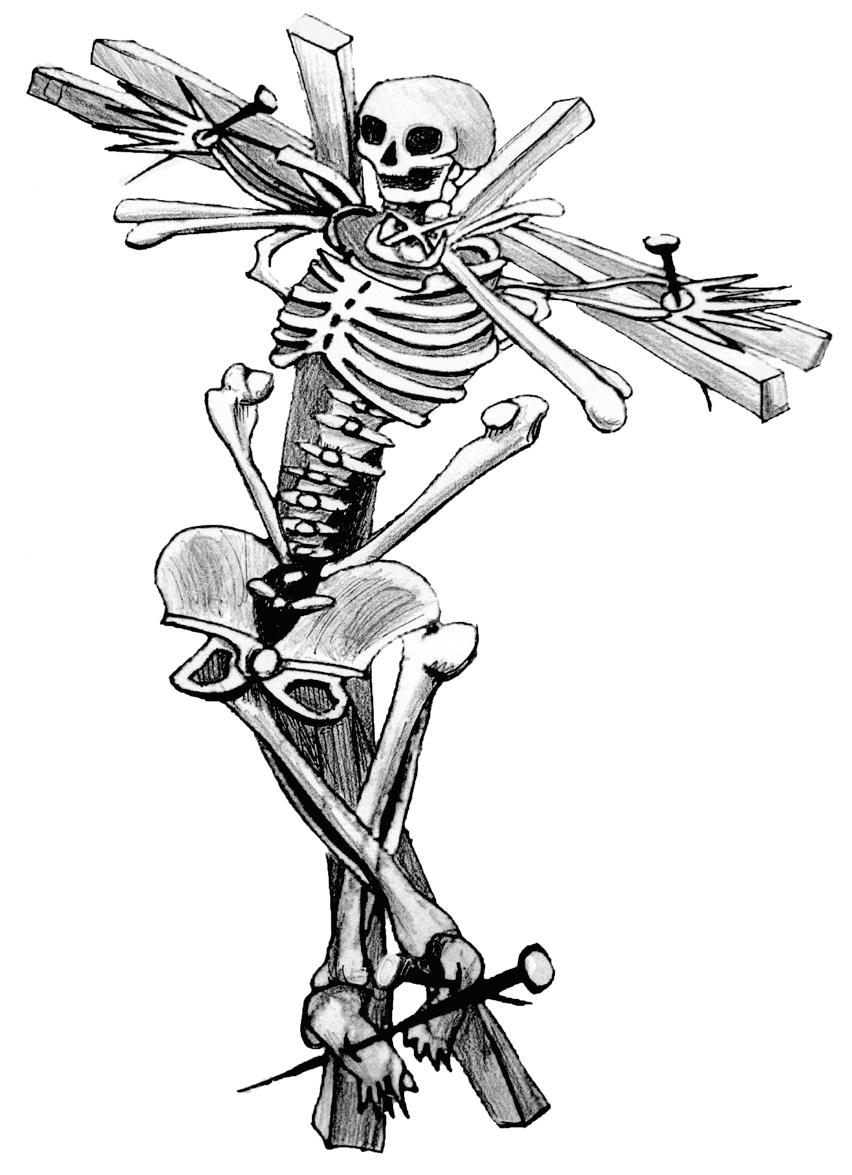
It was dripping wet, reeking of a strangely plastic and rotten aroma. You were biting your lip and your eyes were darting all around; your mind was still racing. “It’s missing a certain…something,” you muttered, and you slithered away to grab a coil of barbed wire. It looked like you had found it or stolen it, as it appeared to be poorly twisted into a circular shape.
Like a crown of thorns, you pressed
the steel barbs into his scalp until the skin was pierced to the bone.
“Come on, come on,” you said. “Help me stand this up against the wall.”
I moved around to the crossbar and hoisted it up on my shoulders, bearing the weight like Simon of Cyrene, though my walk was hardly a spiritual watershed. David was heavier than ever, and my stomach was beginning to churn.
You pushed the cross while I carried, and when we got to the wall across from the door, we carefully propped it up so that it would lay steady on its own. Then you stood back several feet, and your shoulders slumped low.
We didn’t speak for a while. All I could hear was dripping paint as I looked over our work. David’s head was hanging down, staring at his feet, ashamed. His body was plump and puffy, but the gold paint rendered his pudginess as more of a picture of wealth than decay.
My chapped lips parted for the first time in what felt like hours. “What are you gonna call it?”
“‘Forgiven’.”
Once you had christened it, everything made sense. For a moment as brief and fleeting as a summer romance, I understood your heinous work. A spark had leapt between us, some glimmer of mutual perception no language could contrive.
The intimacy that you had dangled at my nose for so long was now washing over me like waves of oxytocin. My mind turned blank and porous, just as it did when you rolled off of me in your father’s bed, and my senses opened up to a world of stimuli no rational human being would ever associate with aesthetic beauty. But there it was: terrible and poignant, simple and transcendent, looming over us like so many ethics and mores and expectations.
David was Forgiven, and how appropriate the medium. Just as my words could only thrive on pounded wood pulp, your art was brought to life upon the flesh of slaughtered youth. That is why I headed for the door; it’s why I ran as far as my legs would take me. You were a god where saints feared to tread, and in that unfathomably minuscule moment, I thought I loved you.
pwatem.tumblr.com • @pwatemvcu • pwatem@gmail.com
Illustration by Skye Young
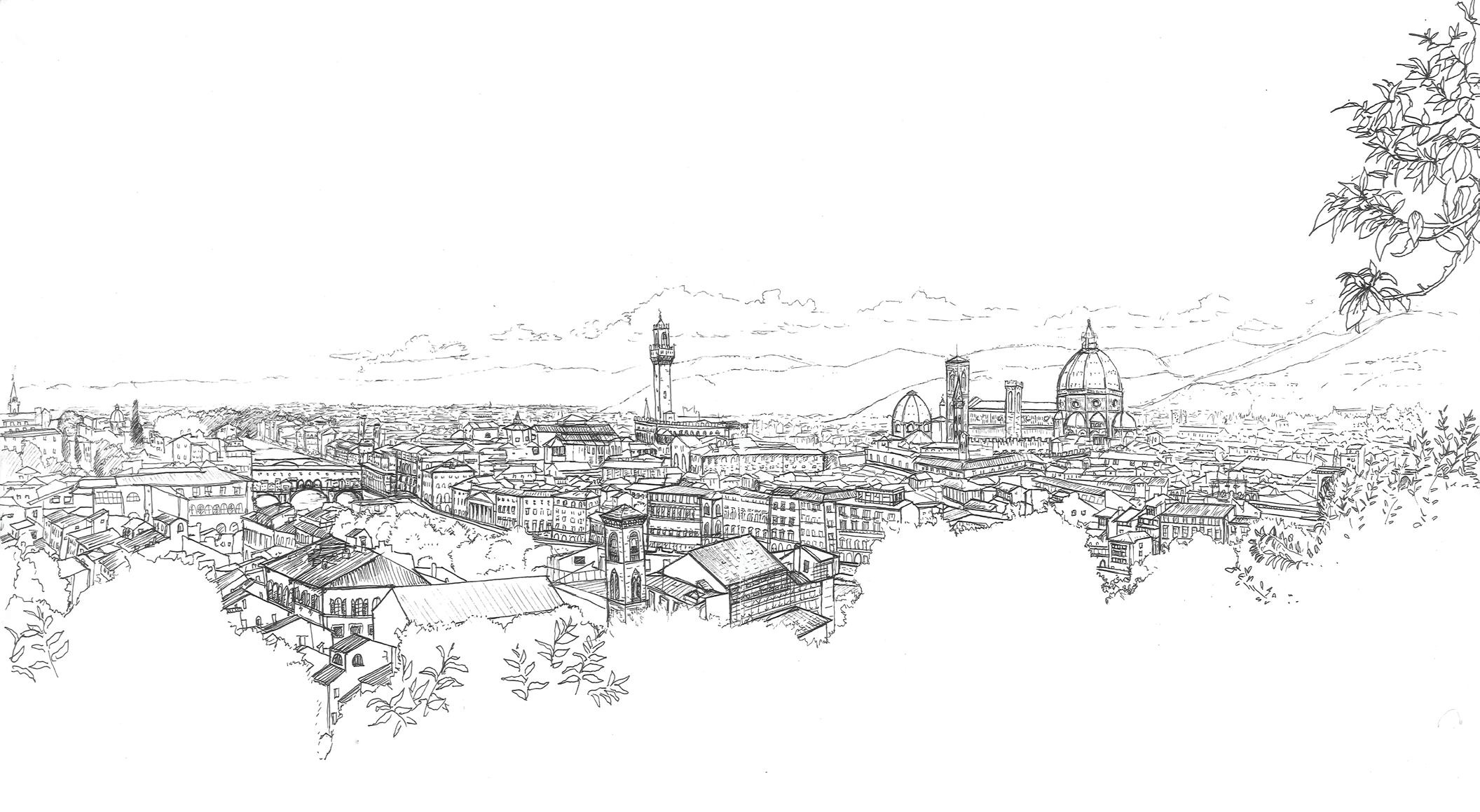
Special thanks goes to Amy Sailer for conceiving this project,

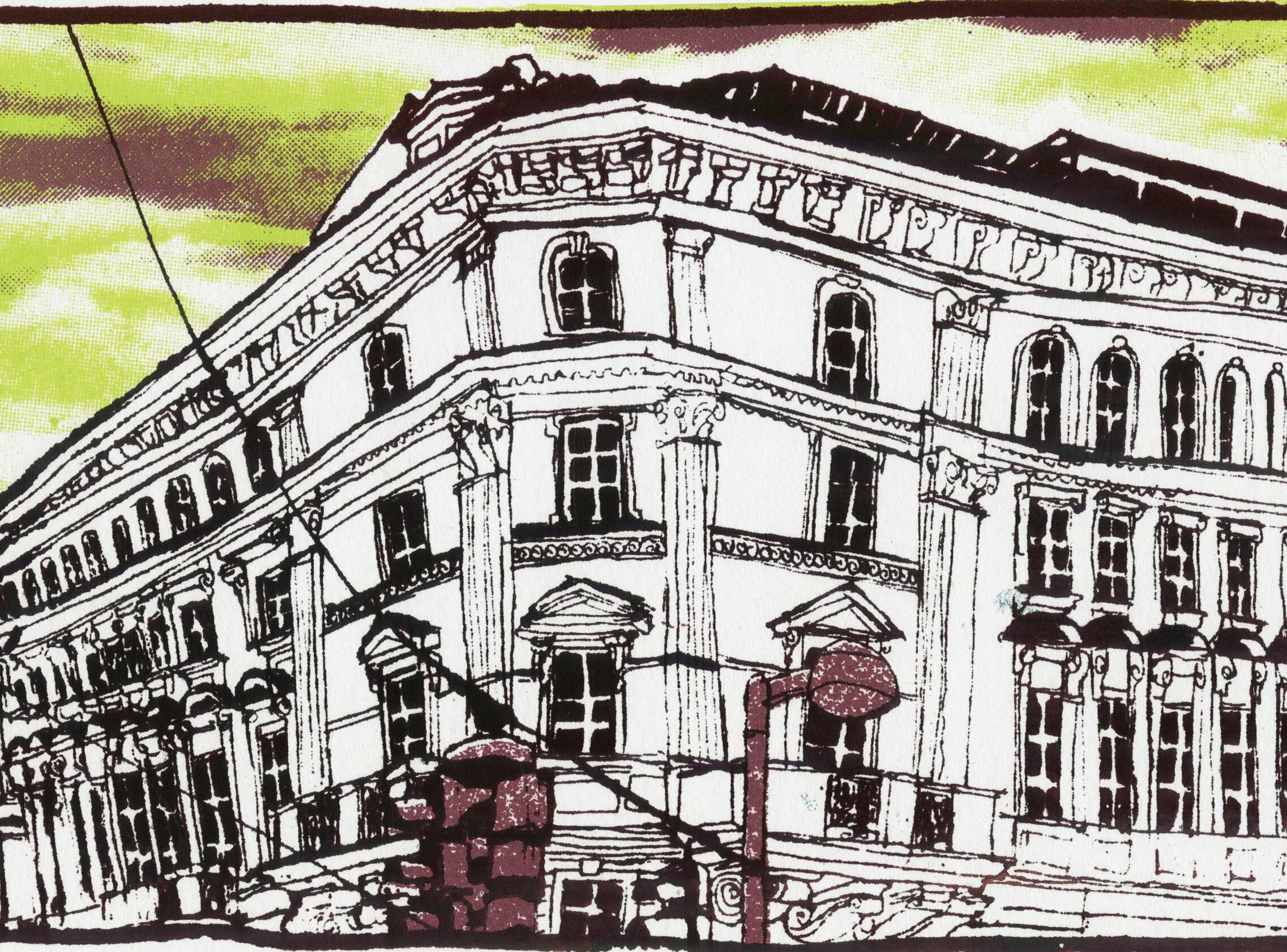




 Stress Kyle Saxton
Emergence Kyle Saxton
BY NICHOLAS MORGAN SHIPMAN
Stress Kyle Saxton
Emergence Kyle Saxton
BY NICHOLAS MORGAN SHIPMAN
 BY LESLIE PYO
BY LESLIE PYO
 Illustration for this story by Ameorry Luo
Illustration for this story by Ameorry Luo



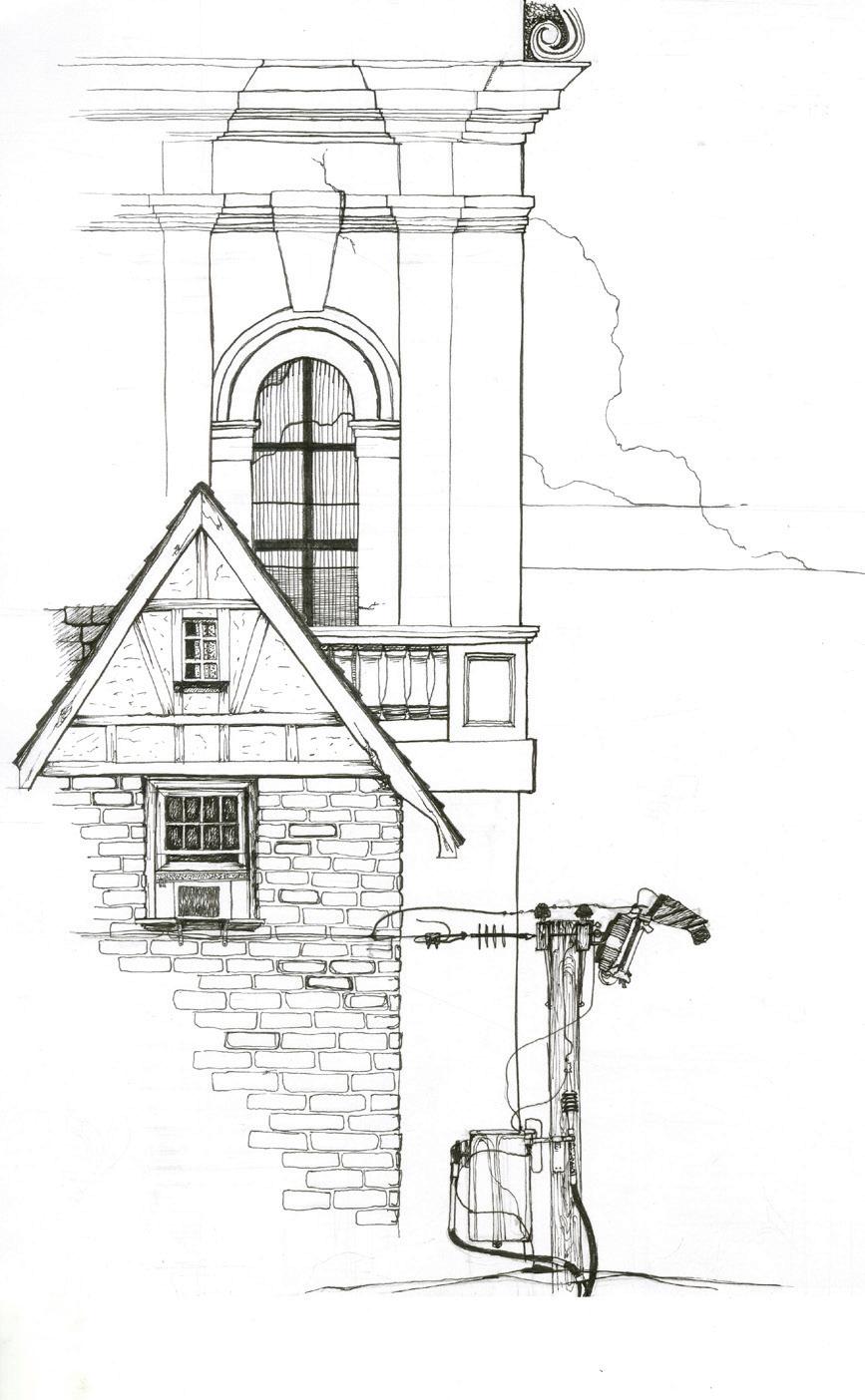
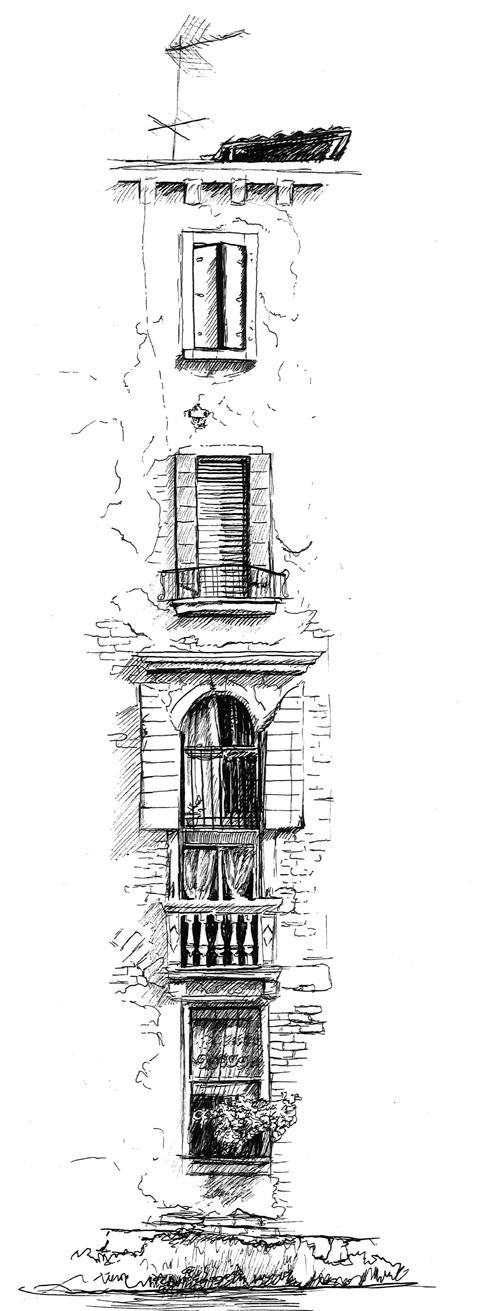 Illustration by Skye Young
By Amanda Hitchcock
Illustration by Skye Young
By Amanda Hitchcock

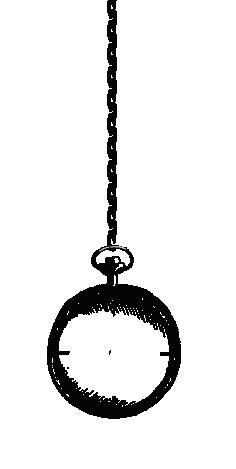





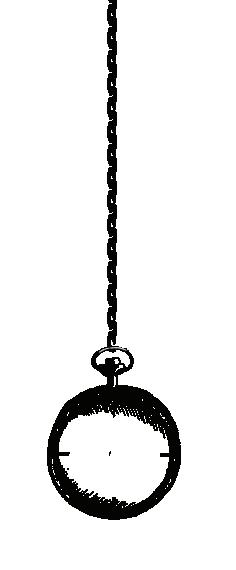

 BY RICHARD DICICCO
BY RICHARD DICICCO






